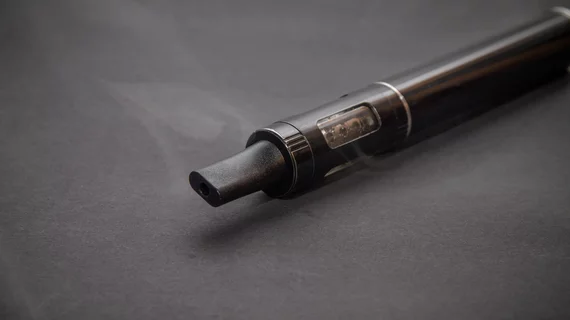Trump administration will ban flavored e-cigarettes
The Trump administration plans to take on e-cigarette use after an outbreak of severe lung disease related to their use caused more than 450 injuries and 6 deaths around the country.
The administration and the FDA plan to finalize a compliance policy over the next few weeks that could ban and phase out non-tobacco-flavored e-cigarettes.
In addition to an uptick in illnesses and deaths related to vaping, the number of teenagers using e-cigarettes has risen rapidly. E-cigarette makers have been criticized for advertising flavored products that appeal to younger consumers.
“Once finalized, this compliance policy will serve as a powerful tool that the FDA can use to combat the troubling trend of youth e-cigarette use. We must act swiftly against flavored e-cigarette products that are especially attractive to children. Moreover, if we see a migration to tobacco-flavored products by kids, we will take additional steps to address youth use of these products,” Acting FDA Commissioner Ned Sharpless, MD, said in a statement.
More than 25% of high school students were current e-cigarette users in 2019, according to HHS. The FDA’s upcoming policy could remove all flavored vape products from markets within 30 days.
“The Trump Administration is making it clear that we intend to clear the market of flavored e-cigarettes to reverse the deeply concerning epidemic of youth e-cigarette use that is impacting children, families, schools and communities,” HHS Secretary Alex Azar said in a statement. “We will not stand idly by as these products become an on-ramp to combustible cigarettes or nicotine addiction for a generation of youth.”
The position from the Trump administration comes just after officials in Kansas confirmed the state’s first death associated with the outbreak of serious lung disease related to vaping. Kansas went even further by urging people to stop using e-cigarettes immediately.
“It is time to stop vaping,” Kansas State Health Officer and Secretary for the Kansas Department of Health and Environment Lee Norman, MD, said in a statement. “If you or a loved one is vaping, please stop. The recent deaths across our country, combined with hundreds of reported lung injury cases continue to intensify. I’m extremely alarmed for the health and safety of Kansans who are using vaping products and urge them to stop until we can determine the cause of vaping related lung injuries and death.”
Similarly, the American Medical Association (AMA) asked the public to stop vaping and warned physicians to educate patients about the rising risks of e-cigarette use.
“In light of increasing reports of e-cigarette-associated lung illnesses across the country, the AMA urges the public to avoid the use of e-cigarette products until health officials further investigate and understand the cause of these illnesses, AMA President Patrice A. Harris, MD, MA, said in a statement. “The AMA recommends anyone who has recently used e-cigarette products to seek medical care promptly if they experience any adverse health effects, particularly coughing, shortness of breath or chest pain.”
Other healthcare industry groups were quick to support the efforts from the FDA and HHS.
“We applaud the Trump Administration’s announcement that it will seek to ban all non-tobacco flavors of e-cigarettes,” said American College of Cardiology President Richard J. Kovacs, MD, FACC. “This is a welcome step in the right direction."
"It's abundantly clear that despite what many e-cigarette companies have tried to advertise, vaping is not a healthy alternative to smoking but rather a gateway for young people to become hooked on nicotine," Jack Coleman, MD, FACS, of the Lung Health Institute, said in a statement. "Banning flavored vape products is an encouraging first step toward halting this epidemic but more needs to be done to protect Americans and especially young people, or else we'll continue hearing of deaths and illnesses for months and years to come.”

